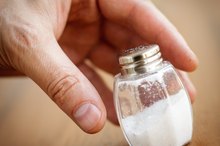Can Too Much Salt Cause Pain in the Joints & Numbness?
Table salt is a common food seasoning that contains the mineral sodium. If you habitually consume too much sodium, you can elevate your blood pressure and significantly increase your risks for a number of serious or potentially fatal health conditions. However, excessive salt intake is not related to pain in your joints or numbness.
Background
Common table salt, also known as sodium chloride, is a compound substance containing 40 percent sodium and 60 percent chloride. You need sodium to support basic body functions, including maintenance of your internal fluid balance, nerve signal transmission and proper relaxation and contraction of your muscles. Adults have a daily minimum sodium requirement of roughly 1,500 mg, and most adults have a recommended maximum daily intake of 2,300 mg. However, the average U.S. adult consumes about 3,400 mg of sodium per day, according to MayoClinic.com.
- Common table salt, also known as sodium chloride, is a compound substance containing 40 percent sodium and 60 percent chloride.
- Adults have a daily minimum sodium requirement of roughly 1,500 mg, and most adults have a recommended maximum daily intake of 2,300 mg.
Blood Levels of Sodium
What Are the Side Effects of Salt Tablets?
Learn More
Under normal circumstances, blood levels of sodium in adults range from 136 mEq/L to 145 mEq/L. If you consume too little sodium, your body will try to raise your levels by reducing the amount of the mineral you lose in your urine. If you consume too much sodium, your body will try to lower your levels by increasing its presence in your urine. However, you can overwhelm your body’s excretion abilities and trigger a sodium buildup in your bloodstream if you habitually eat excessive amounts of the mineral, become dehydrated, use certain medications or have a disease that alters your normal hormone balance.
- Under normal circumstances, blood levels of sodium in adults range from 136 mEq/L to 145 mEq/L.
- If you consume too little sodium, your body will try to raise your levels by reducing the amount of the mineral you lose in your urine.
- If you consume too much sodium, your body will try to lower your levels by increasing its presence in your urine.
Long-Term Effects
When sodium accumulates in your bloodstream, it increases the volume of your blood by attracting and retaining water. In turn, an increase in your blood volume makes your blood harder to pump through your circulatory system. When your blood becomes harder to pump, the workload on your heart increases and pressure placed upon your artery walls rises. Over time, these changes in blood pressure and your heart’s workload can trigger the onset of serious or fatal ailments that include heart disease, congestive heart failure, kidney disease and stroke.
- When sodium accumulates in your bloodstream, it increases the volume of your blood by attracting and retaining water.
Short-Term Effects
Coffee & Sodium Depletion
Learn More
If your blood sodium levels rise above 145 mEq/L, you can develop a high-sodium disorder called hypernatremia. Potential signs or symptoms of this disorder include vomiting, diarrhea, dizziness when you change body positions, severe sweating, fever, irritability, lethargy, increased thirst, shortness of breath, uncontrolled body movement, rapid heartbeat, changes in your normal mental status and bleeding in your brain. However, if you have a mild case of hypernatremia, you may not have any noticeable signs or symptoms at all. Typically, treatment for hypernatremia includes treatment of its underlying cause, as well as medical correction of the current sodium imbalance. Consult your doctor for more information on the potential short- and long-term effects of excessive salt consumption.
- If your blood sodium levels rise above 145 mEq/L, you can develop a high-sodium disorder called hypernatremia.
- Typically, treatment for hypernatremia includes treatment of its underlying cause, as well as medical correction of the current sodium imbalance.
Related Articles
References
- MayoClinic.com: Sodium; How to Tame Your Salt Habit Now (Page 1); March 31, 2011
- ChemoCare.com: Hypernatremia (High Sodium)
- University of Washington: Hypernatremia (Page 2); Jennifer Best, M.D.
- Babaliche P, Madnani S, Kamat S. Clinical Profile of Patients Admitted with Hyponatremia in the Medical Intensive Care Unit. Indian J Crit Care Med. 2017;21(12):819-824. doi:10.4103/ijccm.IJCCM_257_17
- Filippatos TD, Makri A, Elisaf MS, Liamis G. Hyponatremia in the elderly: challenges and solutions. Clin Interv Aging. 2017;12:1957-1965. doi:10.2147/CIA.S138535
- National Institute of Diabetes and Digestive and Kidney Diseases. Hypothyroidism (Underactive Thyroid). Published August 2016.
- Godek SF, Peduzzi C, Burkholder R, Condon S, Dorshimer G, Bartolozzi AR. Sweat rates, sweat sodium concentrations, and sodium losses in 3 groups of professional football players. J Athl Train. 2010;45(4):364-71. doi:10.4085/1062-6050-45.4.364
- Gankam Kengne F, Decaux G. Hyponatremia and the Brain. Kidney Int Rep. 2018;3(1):24-35. doi:10.1016/j.ekir.2017.08.015
- Yasir M, Mechanic OJ. Syndrome of Inappropriate Antidiuretic Hormone Secretion (SIADH). In: StatPearls [Internet]. Treasure Island (FL): StatPearls Publishing; 2019 Jan-. Updated April 2, 2019.
- Liamis G, Milionis H, Elisaf M. A review of drug-induced hyponatremia. Am J Kidney Dis. 2008;52(1):144-53. doi:10.1053/j.ajkd.2008.03.004
- Yee AH, Burns JD, Wijdicks EF. Cerebral salt wasting: pathophysiology, diagnosis, and treatment. Neurosurg Clin N Am. 2010;21(2):339-52. doi:10.1016/j.nec.2009.10.011
- U.S. Food & Drug Administration. Use the Nutrition Facts Label to Reduce Your Intake of Sodium in Your Diet. Updated June 8, 2018.
- Rondon H, Badireddy M. Hyponatremia. In: StatPearls [Internet]. Treasure Island (FL): StatPearls Publishing; 2019 Jan-. Updated December 13, 2018.
- Kapoor K, Fashanu O, Post WS, Lutsey PL, Michos ED, deFilippi CR, McEvoy JW. Relation of Dietary Sodium Intake With Subclinical Markers of Cardiovascular Disease (from MESA). Am J Cardiol. 2019 May 29. pii: S0002-9149(19)30581-8. doi:10.1016/j.amjcard.2019.05.014
Resources
Writer Bio
M. Gideon Hoyle is a writer living outside of Houston. Previously, he produced brochures and a wide variety of other materials for a nonprofit educational foundation. He now specializes in topics related to health, exercise and nutrition, publishing for various websites.









